Since-和-for-的用法及区别
since,for,because,as,nowthat表原因的用法区别
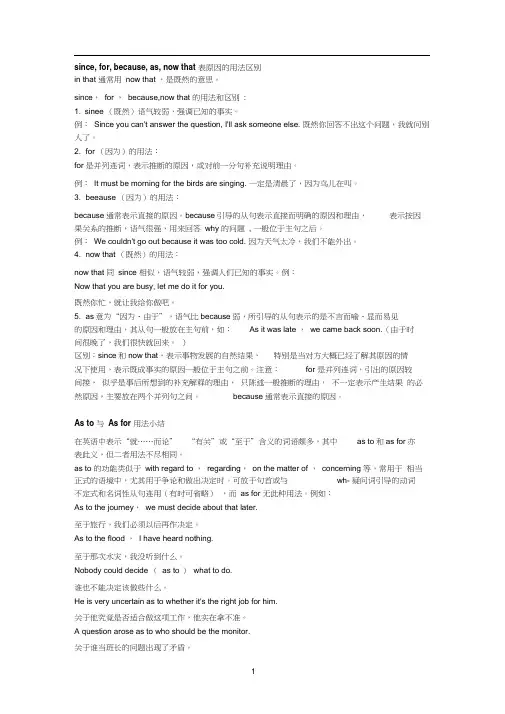
since, for, because, as, now that 表原因的用法区别in that 通常用now that ,是既然的意思。
since,for ,because,now that 的用法和区别:1. sinee (既然)语气较弱,强调已知的事实。
例:Since you can't answer the question, I'll ask someone else. 既然你回答不出这个问题,我就问别人了。
2. for (因为)的用法:for 是并列连词,表示推断的原因,或对前一分句补充说明理由。
例:It must be morning for the birds are singing. 一定是清晨了,因为鸟儿在叫。
3. beeause (因为)的用法:because通常表示直接的原因。
because引导的从句表示直接而明确的原因和理由,表示按因果关系的推断,语气很强,用来回答why 的问题, 一般位于主句之后。
例:We couldn't go out because it was too cold. 因为天气太冷,我们不能外出。
4. now that (既然)的用法:now that 同since 相似,语气较弱,强调人们已知的事实。
例:Now that you are busy, let me do it for you.既然你忙,就让我给你做吧。
5. as意为“因为、由于”,语气比because弱,所引导的从句表示的是不言而喻、显而易见的原因和理由,其从句一般放在主句前,如:As it was late ,we came back soon.(由于时间很晚了,我们很快就回来。
)区别:since和now that,表示事物发展的自然结果,特别是当对方大概已经了解其原因的情况下使用,表示既成事实的原因一般位于主句之前。
注意:for 是并列连词,引出的原因较间接,似乎是事后所想到的补充解释的理由,只陈述一般推断的理由,不一定表示产生结果的必然原因,主要放在两个并列句之间。
现在完成时for 和since的用法小结-优质公开课-外研8下精品
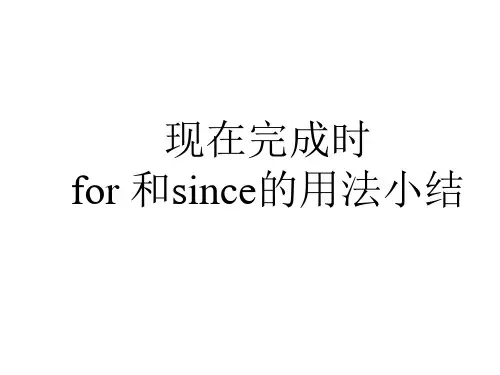
since he was a child.
他打小时侯起就对收集硬币感兴趣。 (现在还是如此)
小窍门: 当现在完成时+一段时间,这一结构中, 我们用下面的公式转化,很容易就能排除非延续 动词在完成时中的误使。 1) (对) Tom has studied Russian for three years. = Tom began to study Russian three years ago, and is still studying it now. 2) (错) Harry has got married for six years. = Harry began to get married six years ago, and is still getting married now. 显然,第二句不对,它应改为 Harry got married six years ago. 或 Harry has been married for six years.
Communications across the Atlantic have developed steadily for one hundred years. He has been talking about the accident since it happened two hours ago. 注意:并非有for 作为时间状语的句子都用现在 完成时。 I worked here for more than twenty years.
(r many years.
(现在我仍在这里工作。)
a) “for” 用于过去的一段时间. (动词必须 是可以延续的) He has been there for six months. 她去那儿有6个月了。(直到现在) He went there 6 months ago. He has never been there. 他从来都没去过那里。(直到现在)
since, for, because, as, now that 表原因的用法区别

since, for, because, as, now that 表原因的用法区别in that通常用now that,是既然的意思。
since,for,because,now that的用法和区别:1.since(既然)语气较弱,强调已知的事实。
例:Since you can't answer the question, I'll ask someone else.既然你回答不出这个问题,我就问别人了。
2. for(因为)的用法:for是并列连词,表示推断的原因,或对前一分句补充说明理由。
例:It must be morning for the birds are singing.一定是清晨了,因为鸟儿在叫。
3. because (因为)的用法:because通常表示直接的原因。
because引导的从句表示直接而明确的原因和理由,表示按因果关系的推断,语气很强,用来回答why的问题, 一般位于主句之后。
例:We couldn't go out because it was too cold. 因为天气太冷,我们不能外出。
4. now that(既然)的用法:now that同since相似,语气较弱,强调人们已知的事实。
例:Now that you are busy, let me do it for you.既然你忙,就让我给你做吧。
5. as意为“因为、由于”,语气比because弱,所引导的从句表示的是不言而喻、显而易见的原因和理由,其从句一般放在主句前,如:As it was late ,we came back soon.(由于时间很晚了,我们很快就回来。
)区别:since和now that,表示事物发展的自然结果,特别是当对方大概已经了解其原因的情况下使用,表示既成事实的原因一般位于主句之前。
注意:for是并列连词,引出的原因较间接,似乎是事后所想到的补充解释的理由,只陈述一般推断的理由,不一定表示产生结果的必然原因,主要放在两个并列句之间。
since的用法时态for
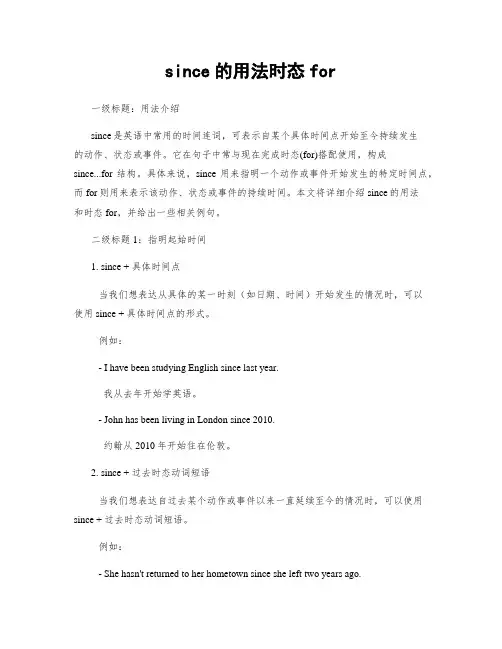
since的用法时态for一级标题:用法介绍since是英语中常用的时间连词,可表示自某个具体时间点开始至今持续发生的动作、状态或事件。
它在句子中常与现在完成时态(for)搭配使用,构成since...for结构。
具体来说,since用来指明一个动作或事件开始发生的特定时间点,而for则用来表示该动作、状态或事件的持续时间。
本文将详细介绍since的用法和时态for,并给出一些相关例句。
二级标题1:指明起始时间1. since + 具体时间点当我们想表达从具体的某一时刻(如日期、时间)开始发生的情况时,可以使用since + 具体时间点的形式。
例如:- I have been studying English since last year.我从去年开始学英语。
- John has been living in London since 2010.约翰从2010年开始住在伦敦。
2. since + 过去时态动词短语当我们想表达自过去某个动作或事件以来一直延续至今的情况时,可以使用since + 过去时态动词短语。
例如:- She hasn't returned to her hometown since she left two years ago.自两年前离开后,她就没有回过家乡。
- They have been good friends since they met in college.自从大学相识以来,他们一直是好朋友。
二级标题2:表示持续时间1. for + 时间段很多情况下我们需要表达一个动作或事件持续了多久,这时可以使用for + 时间段。
例如:- I have been working in this company for five years.我在这家公司工作已经五年了。
- We have lived in this city for a decade.我们在这个城市生活已经十年了。
since 和 for 的用法
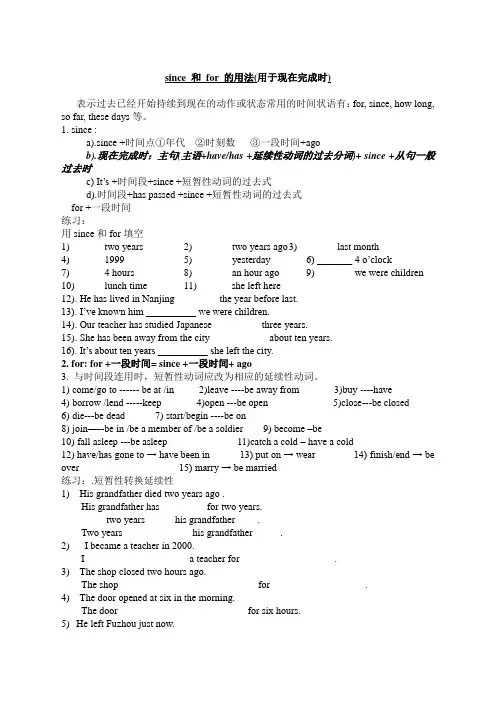
since 和for 的用法(用于现在完成时)表示过去已经开始持续到现在的动作或状态常用的时间状语有:for, since, how long, so far, these days等。
1. since :a).since +时间点①年代②时刻数③一段时间+agob).现在完成时:主句(主语+have/has +延续性动词的过去分词)+ since +从句一般过去时c) It’s +时间段+since +短暂性动词的过去式d).时间段+has passed +since +短暂性动词的过去式for +一段时间练习:用since和for填空1) ______ two years 2) _______ two years ago 3) _______ last month4) ______ 1999 5) _______ yesterday 6) _______ 4 o’clock7) ______ 4 hours 8) _______ an hour ago 9) _______ we were children 10) _____ lunch time 11) ______ she left here12). He has lived in Nanjing ________ the year before last.13). I’ve known him __________ we were children.14). Our teacher has studied Japanese _________ three years.15). She has been away from the city ___________ about ten years.16). It’s about ten years __________ she left the city.2. for: for +一段时间= since +一段时间+ ago3. 与时间段连用时,短暂性动词应改为相应的延续性动词。
Because,since,as,for的用法区别
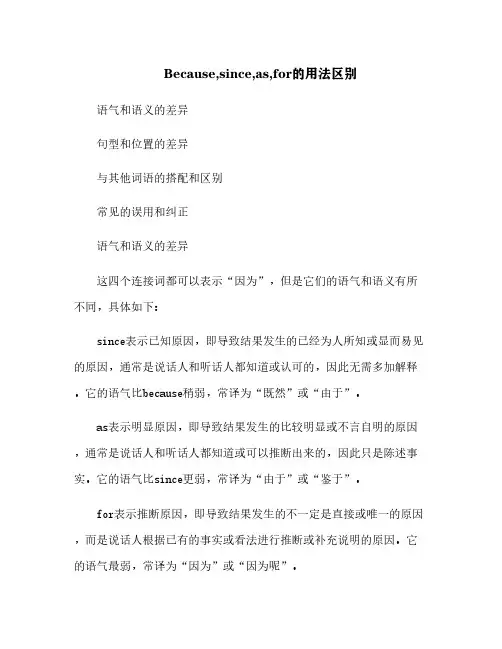
Because,since,as,for的用法区别语气和语义的差异句型和位置的差异与其他词语的搭配和区别常见的误用和纠正语气和语义的差异这四个连接词都可以表示“因为”,但是它们的语气和语义有所不同,具体如下:since表示已知原因,即导致结果发生的已经为人所知或显而易见的原因,通常是说话人和听话人都知道或认可的,因此无需多加解释。
它的语气比because稍弱,常译为“既然”或“由于”。
as表示明显原因,即导致结果发生的比较明显或不言自明的原因,通常是说话人和听话人都知道或可以推断出来的,因此只是陈述事实。
它的语气比since更弱,常译为“由于”或“鉴于”。
for表示推断原因,即导致结果发生的不一定是直接或唯一的原因,而是说话人根据已有的事实或看法进行推断或补充说明的原因。
它的语气最弱,常译为“因为”或“因为呢”。
举例说明:I stayed at home because itrned.(我呆在家里是因为下雨了。
)这里because表示下雨是我呆在家里的直接原因,可能是听话人不知道下雨了,所以需要解释。
Since you are so busy, I won't bother you anymore.(既然你这么忙,我就不再打扰你了。
)这里since表示你很忙是我不再打扰你的已知原因,可能是说话人和听话人都知道你很忙,所以无需多说。
As he is a teacher, he knows alot.(由于他是老师,他知道很多。
)这里as表示他是老师是他知道很多的明显原因,可能是说话人和听话人都认为老师知道很多,所以只是陈述事实。
He must be ill, for he lookspale.(他一定生病了,因为他看起来很苍白。
)这里for表示他看起来很苍白是他生病了的推断原因,可能是说话人根据他苍白的面色进行推测或补充说明。
句型和位置的差异这四个连接词在句型和位置上也有一些差异,具体如下:because为从属连词,引导原因状语从句,从句可以放在主句之前或之后,但如果放在主句之前,则要用逗号隔开;如果单独存在,则要用冒号引出。
现在完成时for 和since用法
现在完成时二用法:过去完成时表示过去发生的动作或存在的状态一直持续到现在(包括现在在内),常与for和since引导的时间状语连用,动词需要用延续性动词。
如:Mr.Green has been in China for 10 years .(格林先生来中国10年了)The film has been on for 20 minutes.(电影开始已经20分钟了)Since 与for的区别:for后面跟一段时间如:for three days for 2 years 等+ 过去的时间点:since 2004Since+ 一段时间ago :since two minutes ago+ 过去时的句子:since I came to this school用since 和for 填空:1.I have kept the book _______ a week , I must return it on time .2.We have learned English _______ 5 years ago, so we have learned it ______ 5 years.3.Miss Li has taught maths ________ she came to this school ..4.I have had a cold _______ yesterday.5.The workers have worked _______ 10 hours . They are very tired.6.Great changes have taken place in China ______ it was founded.7.Our teacher has studied Japanese ______ three years.8. She has been away from the city ______ about ten years.9.. It’s about ten years __________ she left the city.短暂性动词的完成时态不能和表示一段的时间状语连用,当它需要与表示一段时间的时间状语连用时,通常需进行转化,见书119页。
since, for, because, as, now that 表原因的用法区别
since, for, because, as, now that 表原因的用法区别in that通常用now that,是既然的意思。
since,for,because,now that的用法和区别:(既然)语气较弱,强调已知的事实。
例:Since you can't answer the question, I'll ask someone else.既然你回答不出这个问题,我就问别人了。
2. for(因为)的用法:for是并列连词,表示推断的原因,或对前一分句补充说明理由。
例:It must be morning for the birds are singing.一定是清晨了,因为鸟儿在叫。
3. because (因为)的用法:…because通常表示直接的原因。
because引导的从句表示直接而明确的原因和理由,表示按因果关系的推断,语气很强,用来回答why的问题, 一般位于主句之后。
例:We couldn't go out because it was too cold. 因为天气太冷,我们不能外出。
4. now that(既然)的用法:now that同since相似,语气较弱,强调人们已知的事实。
例:Now that you are busy, let me do it for you.既然你忙,就让我给你做吧。
5. as意为“因为、由于”,语气比because弱,所引导的从句表示的是不言而喻、显而易见的原因和理由,其从句一般放在主句前,如:As it was late ,we came back soon.(由于时间很晚了,我们很快就回来。
)区别:since和now that,表示事物发展的自然结果,特别是当对方大概已经了解其原因的情况下使用,表示既成事实的原因一般位于主句之前。
注意:for是并列连词,引出的原因较间接,似乎是事后所想到的补充解释的理由,只陈述一般推断的理由,不一定表示产生结果的必然原因,主要放在两个并列句之间。
Because,since,as,for的用法区别[4]
Because,since,as,for的用法区别引言语气语序语域搭配特殊用法语气表示原因或理由的连接词,从语气上由强到弱可以排列为:becau se>since>as>for。
because例如:I stayed at home because it rned. 因为下雨我呆在家里。
Lisa didn't come to school because she was ill.Lisa因病没有来上学。
It is because I have stayed here for more than 10 years that I don't want to move to other cities.是因为我们在这里已经住了10多年了,所以我不想搬到其他城市去。
(强调句型)sincesince侧重主句,从句表示显然的或已为人所知的理由,常译为“因为”、“既然”,语气比because稍弱,通常置于句首,表示一种含有勉强语气的原因。
例如:Since he is asking you, you'd better tell him why.他既然在问你,你最好告诉他为什么。
Since everyone is here, let's set out.既然大家都到齐了,我们就出发吧!asas是常用词,它表示的“原因”是双方已知的事实或显而易见的原因,或者理由不是很重要,含义与since相同,但语气更弱,没有si nce正式。
从句说明原因,主句说明结果,主从并重。
例如:We all like her as she is kind.我们都喜欢她,因为她善良。
As I had a cold, I was absent from school.因为我感冒了,所以没去上课。
forfor与because相似,但它所表示的原因往往提供上文未交待过的情况。
for不表示直接原因,表明附加或推断的理由,它所引导的分句只能放在句子后部(或单独成为一个句子),用逗号隔开,且for不可置于句首,for的这一用法常用在书面语中,较正式。
since, for, because, as, now that 表原因的用法区别
since, for, because, as, now that 表原因的用法区别in that通常用now that,是既然的意思。
since,for,because,now that的用法和区别:1.since(既然)语气较弱,强调已知的事实。
例:Since you can't answer the question, I'll ask someone else.既然你回答不出这个问题,我就问别人了。
2. for(因为)的用法:for是并列连词,表示推断的原因,或对前一分句补充说明理由。
例:It must be morning for the birds are singing.一定是清晨了,因为鸟儿在叫。
3. because (因为)的用法:because通常表示直接的原因。
because引导的从句表示直接而明确的原因和理由,表示按因果关系的推断,语气很强,用来回答why的问题, 一般位于主句之后。
例:We couldn't go out because it was too cold. 因为天气太冷,我们不能外出。
4. now that(既然)的用法:now that同since相似,语气较弱,强调人们已知的事实。
例:Now that you are busy, let me do it for you.既然你忙,就让我给你做吧。
5. as意为“因为、由于”,语气比because弱,所引导的从句表示的是不言而喻、显而易见的原因和理由,其从句一般放在主句前,如:As it was late ,we came back soon.(由于时间很晚了,我们很快就回来。
)区别:since和now that,表示事物发展的自然结果,特别是当对方大概已经了解其原因的情况下使用,表示既成事实的原因一般位于主句之前。
注意:for是并列连词,引出的原因较间接,似乎是事后所想到的补充解释的理由,只陈述一般推断的理由,不一定表示产生结果的必然原因,主要放在两个并列句之间。
- 1、下载文档前请自行甄别文档内容的完整性,平台不提供额外的编辑、内容补充、找答案等附加服务。
- 2、"仅部分预览"的文档,不可在线预览部分如存在完整性等问题,可反馈申请退款(可完整预览的文档不适用该条件!)。
- 3、如文档侵犯您的权益,请联系客服反馈,我们会尽快为您处理(人工客服工作时间:9:00-18:30)。
一,since 的四种用法1,since + 过去一个时间点(如具体的年、月、日期、钟点、ago. 1990 , last month , half past sixI have been here since 1990. 1990起,我一直在这儿。
2,since+ 一段时间+agoI h a v e b e e n h e r e s i n c e f i v e m o n t h s a g o。
自从五个月前,我已经在这儿了。
3,since+从句GreatChanges have taken place since you left. 自从你走后,已经发生了很大的变化。
4,It is +一段时间+since从句I t i s t w o y e a r s s i n c e I b e c a m e a n E n g l i s h t e a c h e r.我成为英语老师有两年了。
二,Since 和for区别1,Since +时间点,具体时间“自I have been in Beijing since 2010.从、以来,从、、、以后”用来说明动作起始时间2,For + 时间段,用来说明动作延续时间长度,因此句中的谓语动词,也应该是延续性动词。
I have been in Beijing for one year。
We have learnt English for about three years.I have been here for 3 days. (对)I have arrived here for 3 days.(误)三,延续性动词和终止性动词的概念英语中,动词按其动作发生的方式、动作发生过程的长短,可分为延续性动词和终止性动词。
延续性动词表示能够延续的动作,这种动作可以延续下去或产生持久影响。
如:learn, work, stand, lie, know, walk, keep, have, wait, watch, sing, read, sleep,live, stay等。
终止性动词也称非延续性动词、瞬间动词或短暂性动词,表示不能延续的动作,这种动作发生后立即结束。
如open, close, finish, begin, come, go, arrive, reach, get to, leave, move, borrow,buy 等。
四、延续性动词的用法特征1.延续性动词可以用于现在完成时,其完成时态可与表示"段时间"的状语连用。
表示"段时间"的短语有:for two years, during the past three years, since last year, how long 等I have learned English since I came here. 自从我来到这儿就学英语了。
2.延续性动词不能与表示短暂时间的"点时间"状语连用。
如:It raind at eight yesterday morning . (误)rain为延续性动词,而at eight表示"点时间",前后显然矛盾。
如果用延续性动词性动词来表示一瞬间的动作,可借助come begin get等终止性动词来表示。
上句可改为:It began to rain at eight yesterday morning.(正)又如:-When did you get to know Jack-Two years ago.-Then you've known each other for more than two years.-That's right.五、终止性动词的用法特征1.终止性动词可用来表示某一动作完成,因此可用于现在完成时。
如:The train has arrived.火车到了。
Have you joined the computer group你加入电脑小组了吗2.终止性动词表示的动作极其短暂,不能持续。
因此,不可与表示一段时间的状语用(只限肯定式)。
如:(1)他死了三年了。
误:He has died for three years.正:He has been dead for three years.正:He died three years ago.正:It is three years since he died.正:Three years has passed since he died.(2)他来这儿五天了。
误:He has come here for five days.正:He has been here for five days.正:He came here five days ago.正:It is five days since he came here.正:Five days has passed since he came here.句中终止性动词转换为相应的延续性动词,如上面两例中的第一种正确表达方式。
下面列举几例:leave→be away, borrow→keep, buy→have, begin/start→beon, die→be dead, move to→live in, finish→be over, join→be in/be amemberof, open sth.→keep sth. open, fall ill→be ill, get up→be up, catch a cold→have a cold。
练习:用since和for填空1) ______ two years 2) _______ two years ago 3) _______ last month4) ______ 1999 5) _______ yesterday 6) _______ 4 o’clock7) ______ 4 hours 8) _______ an hour ago 9) _______ we were children10) _____ lunch time 11) ______ she left here1. He has lived in Nanjing ________ the year before last.2. I’ve known him __________ we were ch ildren.3. Our teacher has studied Japanese _________ three years.4. She has been away from the city ___________ about ten years.5. It’s about ten years __________ she left the city.2.短暂性转换延续性①arrive at/in sw. get to/reach sw. come/go/move to sw.→ be in sw./at school/at home/on the farm/be here/be there1) He got to Beijing five minutes ago.He ________ _________ _________ Beijing for _________ _________.2) I moved to the USA last year.I ________ ________ __________ the USA since __________ __________.3) I went home yesterday.I _______ ________ _________ home for _________ __________.4) They came here last week.They _________ _________ here since _________ __________.②come/go back, return → be back come/go out → be o ut1) He came out two years ago.He _________ __________ _________ for __________ __________.2) We return to Fuzhou yesterday.We ________ ________ _________ to Fuzhou since __________.③become → be1) I became a teacher in 2000.I ________ __________ a teacher for _________ _________.2) The river became dirty last year.The river _________ _________ dirty for _________ __________.④close → be closed open → be open1) The shop closed two hours ago.The shop ________ _________ _________ for _________ _________.2) The door opened at six in the morning.The door ________ ________ ________ for six hours.⑤get up → be up die → be deadleave sw. → be away from sw.fall asleep/get tot sleep → be asleepfinish/end → be over marry → be married1) I got up two hours ago.I ________ ________ ________ since ________ ________.2) He left Fuzhou just now.He _______ ________ ________ _________ Fuzhou for five minutes.3) My grandpa died in 2002.My grandpa _______ _______ ________for _______ ________.4) The meeting finished at six.The meeting ________ ______ ______ for six hours.5) I got to sleep two hours ago.I ________ _________ _________ since _________ __________.6) They married in 1990.They ________ _________ __________since _________.⑥start/begin to do sth. → do sth. begin → be on1) I began to teach at this school in 1995.I ____ ____ at this school since ____.2) The film began two minutes ago.The film ____ ____ ____ for ____ ____.⑦borrow → keep lose → not have buy → have put on → wearcatch/get a cold → have a cold get to know → know1) They borrowed it last week.They _________ _________ it since __________ __________.2) I bought a pen two hours ago.I _________ _________ a pen for ________ __________.3) I got to know him last year.I _________ __________ him since __________ __________.4) I put on my glasses three years ago.I __________ __________ my glasses for _________ _________.⑧have/has gone to → have been in1) He has gone to Beijing.He ____ ____ _____ Beijing for two days.⑨join the league/the Party/the army→ be a league/a Party member/a soldier→ be a member of the league/the Party→ be in the league/the Party/the army1) He joined the league in 2002.He ________ _________ a _________ _________ for two years.He ________ __________ a __________ ___________ the __________ for two years. He ____________ ___________ ___________ the league for two years.2) My brother joined the army two years ago.My brother __________ __________ a ___________ for ___________ ___________. My brother ___________ ___________ in ____________ ___________ for two years.3.汉译英1)这本字典我已买了三年了。
